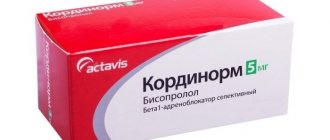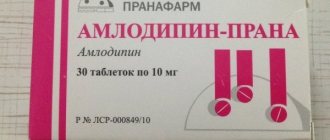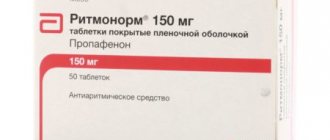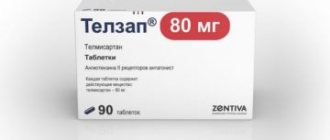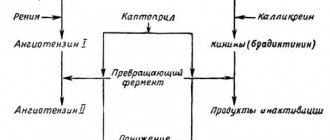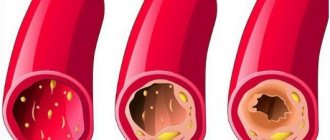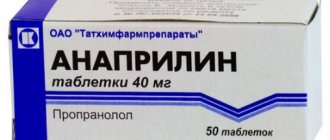general information
Biol tablets are a synthetic drug intended to lower blood pressure. The drug, part of the group of beta blockers, has a negative ionotropic effect, reducing the load on the heart.
Form and approximate prices
The medicine is produced in tablet form. The content of the active component can be different - 5 or 10 mg. This number and the engraving “BIS” are applied to one of the sides, and on the other there is a cross-shaped mark. The tablets, packed in blisters of ten pieces, are in a cardboard package.
The drug can be stored for 4 years from the date of release in a cool, dry place without exposure to sunlight. To ensure the safety of children, it is necessary to limit their access to pills.
The price varies depending on the content of the main component, the number of blisters in the package and the pharmacy where the product is purchased. The average cost of a package of 30 tablets of 5 mg is 180-205 rubles, for 10 mg - from 235 to 270 rubles. A prescription from a doctor is required to purchase.
Instructions for use Biol (method and dosage)
Biol tablets are taken orally, in the morning, on an empty stomach, 1 time per day (with a small amount of water). The tablets should not be crushed or chewed.
For arterial hypertension and coronary heart disease, use 5 mg once a day. If necessary, the dose is increased to 10 mg 1 time per day.
For the treatment of angina pectoris and arterial hypertension, the maximum daily dose is 20 mg 1 time / day.
When treating CHF, the recommended initial dose of the drug is 1.25 mg (1/4 tablet of 5 mg each) 1 time per day. Then the dose should be gradually increased to 2.5 mg (1/2 tablet of 5 mg), 3.75 mg (3/4 tablet of 5 mg), 5 mg (1 tablet of 5 mg or 1/2 tablet 10 mg), 7.5 mg (3/4 tablets of 10 mg) and 10 mg once a day with a break of at least 2 weeks.
If the dose increase is poorly tolerated by the patient, it is advisable to reduce the dose.
The maximum permissible dose of the drug for the treatment of CHF is 10 mg 1 time per day.
During titration, regular monitoring of blood pressure, heart rate and signs of increasing severity of heart failure is required.
During the titration phase or after it, a temporary worsening of CHF, bradycardia or arterial hypotension is possible. In this case, it is recommended to pay attention to the selection of the dose of concomitant standard therapy.
Composition and mechanism of action
The active ingredient is Bisoprolol hemifumarate. It reduces the pressure-increasing effects of renin on the myocardium. As a result, the load on the heart muscle, its oxygen demand and heart rate are reduced.
In addition, the medicine includes additional components:
microcrystalline cellulose – removes harmful substances and cholesterol from the body, which negatively affects the functioning of the heart;- calcium hydrogen phosphate – has an anti-inflammatory effect and strengthens the walls of blood vessels;
- croscarmellose sodium - used as a disintegrant to shape the medicine;
- Magnesium stearate – increases the heart’s ability to contract and has a positive effect on the nervous system;
- corn starch – provides additional cellular nutrition;
- colloidal anhydrous silicon dioxide - will accelerate the process of metabolism and elimination of substances harmful to the body.
The following substances are used in the manufacture of the shell:
- lactose monohydrate;
- hypromellose;
- titanium dioxide;
- macrogol 4000.
Red and yellow iron oxide are used to color the tablets.
The drug inhibits the activity of renin, as a result of which the rate of formation of cAMP, which affects the distribution of hormones throughout the body, decreases. The antihypertensive effect is achieved by combining active ingredients and reducing the active functioning of the symptoadrenal system. The result is a decrease in minute volume of circulating blood.
Removal of the drug from the body occurs over 9-12 hours through the kidneys and intestines.
Side effects
In case of an overdose, symptoms of overdose may appear: a sharp drop in blood pressure, acute cardiac contractions, a strong drop in blood sugar, arrhythmia, narrowing of the bronchi, respiratory failure, bluish skin, fainting, convulsions.
| Systems and organs of influence | Frequency of occurrence | ||||
| Often | Often | Infrequently | Rarely | Very rarely | |
| CNS | ― | ― | Chronic fatigue, dizziness, sleep disturbance, headache. | Nightmares, muscle spasms, hallucinations | ― |
| Sense organs | ― | ― | ― | Dry eyes, decreased vision | Conjunctivitis |
| SSS | Sinus rhythm disorder | Angiospasm (icy legs), decreased blood pressure | AV conduction disturbances, peripheral edema, orthostatic hypotension | ― | ― |
| Gastrointestinal tract | ― | Dry mouth, diarrhea, attacks of nausea, vomiting, delayed bowel movements | ― | Hepatitis | ― |
| Respiratory system | ― | ― | Difficulty in breathing (when taking large doses) | Stuffy nose, bronchospasm | ― |
| Endocrinology | Patients with diabetes mellitus experience cases of hyper- and hypoglycemia. Changes in sugar levels depend on the type of illness. | ||||
| Allergic reactions | ― | ― | ― | Rashes, hives, irritation | ― |
| Skin | ― | ― | ― | Increased sweating, flushing of blood to the skin | Exacerbation of psoriasis, alopecia |
| Musculoskeletal system | ― | ― | Convulsive contractions, muscle weakness, arthralgia | ― | ― |
"Biol" delays the development of the fetus in the womb, causes a decrease in glucose levels and a decrease in the frequency of contractions of the heart muscle. In rare cases, it affects laboratory test results: affects liver tests, leads to agranulocytosis or thrombocytopenia. Impaired potency in men, increased blood pressure and increased frequency of angina attacks are possible with o.
Properties
The drug has a hypotensive effect, while eliminating arrhythmic manifestations and reducing the need for oxygen. When the beta-adrenergic receptors of the heart are blocked, the intracellular current of calcium ions decreases, as a result of which the conductivity and excitability of blood vessels becomes less.
The antiangile effect is achieved due to prolongation of diastole and the absence of additional myocardial oxygen demand.
For hypertension, the effect appears within 2-5 days, and with constant use, the stability of the condition begins to be monitored after a month.
Indications and contraindications
Before purchasing and trying to lower high blood pressure on your own, you need to understand what the medicine helps with. Biol is indicated for use in the following cases:
- chronic heart failure in passive and active forms;
- arterial hypertension;
- IBS.
CHF
The cardiologist may also recommend therapy to prevent exacerbations of stable angina.
Due to insufficient knowledge, the drug is not used in childhood. It is also prohibited to use the medicine in the presence of the following violations:
- cardiogenic shock;
- low blood pressure;
- OSN;
- manifestations of bronchial asthma;
- sinoarterial blockade;
- bradycardia;
- peripheral circulatory disorders;
- cardiomegaly.
Cardiomegaly
If you have an increased level of sensitivity to the constituent components or allergies, it is also prohibited to take the drug. Only on the recommendation of a specialist can use the drug in the presence of diabetes, severe renal dysfunction and congenital heart defects.
The periods of lactation and childbearing are contraindications for therapy with the drug.
Contraindications
- Acute heart failure and chronic heart failure in the stage of decompensation;
- Collapse;
- Sick sinus syndrome;
- Severe arterial hypotension;
- Severe peripheral circulatory disorders;
- Severe forms of bronchial asthma and chronic obstructive pulmonary disease;
- Bradycardia;
- Raynaud's syndrome;
- Hypersensitivity to Biol components and other beta-blockers;
- Pheochromocytoma;
- AV block II and III degrees;
- Cardiogenic shock;
- Metabolic acidosis;
- Sinoatrial block;
- Cardiomegaly;
- Concomitant use of floctafenine and sultopride.
Biol is not recommended for use by people under 18 years of age.
Use of the drug during pregnancy can lead to intrauterine death of the fetus, slower growth, miscarriage or premature birth. There is a possibility of pathological reactions, such as intrauterine hypoglycemia, developmental delay, bradycardia. Therefore, the use of Biol during this period, as well as during breastfeeding, is not recommended.
Biol is taken with caution:
- Hyperthyroidism;
- AV block of the first degree;
- Congenital heart defect;
- Depression;
- Chronic heart failure with myocardial infarction within the last 3 months;
- Severe renal failure and impaired liver function;
- Carrying out desensitizing therapy;
- Diabetes mellitus type 1;
- Pheochromocytoma;
- Prinzmetal's angina;
- Psoriasis;
- Restrictive cardiomyopathy.
Instructions for use
The dosage is selected by the attending physician individually. The instructions for use mention that the greatest effect is observed when taking the product in the morning, regardless of food intake. The tablets should be swallowed without chewing and washed down with water.
The minimum dose is 5 mg, if necessary it can be increased to 10 mg. If there is a sharp decrease in blood pressure, it is necessary to adjust the prescribed amount of the drug. Elderly people can take the medicine in a standard dosage.
Therapy should not be abruptly interrupted - it is necessary to gradually reduce the amount of the drug by 1/4 every two to three days.
It is necessary to pay attention to the fact that the interaction of Biol with diuretics, local beta-blockers, sedatives and antidepressants can change its medicinal properties. There is a decrease in the effectiveness of the drug in smoking patients.
While taking this medicine, you should not drive or engage in activities that require a high level of attention and concentration. During the course of therapy it is strictly prohibited to drink alcohol.
special instructions
With simultaneous use of Biol with antiarrhythmic drugs of class 1 and 3, beta-blockers for topical use (including drops for the treatment of glaucoma), beta-agonists, mefloquine, insulin, ethanol, nifedipine, diuretics, clonidine, sympatholytics, tricyclic and tetracyclic antidepressants, hydralazine , antipsychotic, sedative and hypnotic drugs may develop undesirable side effects, leading to a change in the therapeutic effect of the drugs.
If depression develops, it is recommended to discontinue drug therapy.
Treatment should not be interrupted abruptly, since there is a high risk of developing myocardial infarction and severe arrhythmias. Cancellation is carried out gradually, reducing the dose over two weeks or more, every 3-4 days by one quarter.
It is necessary to stop taking Biol before donating blood and urine to study the concentration of normetanephrine, vanillinmandelic acid, catecholamines, and antinuclear antibody titers.
The effectiveness of beta blockers is reduced in patients who smoke.
During Biol therapy, special care should be taken when driving vehicles and engaging in potentially hazardous activities that require increased concentration and high speed of psychomotor reactions.
Possible side effects and overdose
The most common side effect is increased heart rate. The following ailments may also occur:
dizziness;- a sharp decrease in blood pressure;
- fatigue and general state of weakness;
- dyspnea;
- pressing chest pain;
- state of increased anxiety and sleep disturbances.
Some patients complain of itchy skin, diarrhea and nasal congestion. In isolated cases, manifestations in the form of nightmares, hallucinations and short-term amnesia are observed.
If the prescribed dosage is exceeded, the following disturbances in the functioning of the body are possible:
- increased heart rate, arrhythmia;
- headache and dizziness;
- AV block;
- decreased blood pressure up to hypotension;
- breathing problems;
- fainting.
AV blockade
If an overdose occurs, it is necessary to rinse the stomach and use adsorbent drugs. If symptoms are severe, you should seek medical help.
Side effects
According to reviews, Biol may cause side effects.
Nervous system: headache, dizziness, fatigue, asthenia, depression, sleep disturbances, anxiety, short-term memory loss, confusion, hallucinations, tremor, myasthenia gravis, muscle cramps. These symptoms usually disappear 1-2 weeks after starting Biol therapy.
Cardiovascular system: bradycardia, palpitations, severe decrease in blood pressure, vasospasm, impaired AV conduction, arrhythmia, chest pain, orthostatic hypotension, worsening CHF with the development of swelling of the feet and ankles, shortness of breath.
Respiratory system: bronchospasm, nasal congestion, allergic rhinitis.
Sense organs: blurred vision, tinnitus, decreased lacrimation, ear pain, decreased hearing, taste disturbances, conjunctivitis, sore and dry eyes.
Digestive system: nausea, vomiting, constipation, diarrhea, dry mouth, abdominal pain, increased activity of liver enzymes, changes in taste, increased bilirubin concentration.
Musculoskeletal system: back pain, arthralgia.
Genitourinary system: weakened libido, impaired potency.
Allergic reactions: rash, itchy skin, urticaria.
Analogs
Analogues of the active substance and drugs with a similar mechanism of action on the body can be distinguished. Structural analogues are the following:
- Biprol (120-400 rub.).
- Concor Cor (150-210 rubles).
- Coronal (130-235 rubles).
- Aritel (100-160 rubles).
- Cordinorm (170-500 rub.).
Among the drugs with similar mechanisms of influence, the following drugs stand out:
- Atenolol (30-60 rub.).
- Vasocardin (150-210 rub.).
- Nebilet (660-900 rubles).
- Betalok (520-910 rub.).
Like the price of Biol, the cost of its analogues depends on the amount of active ingredient, manufacturer and pharmacy. You can replace the drug only after prior consultation with your doctor.

